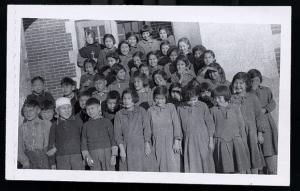Jack’s Story
Case Study Downloads
- Meet Jack (PPT)
- Jack’s Story (Single Slide) (PPT)
- Jack’s Story (DOCX)
- Teaching Notes (In Progress)
Applicable Courses
- Health Promotion and Active Living
- Social Determinants of Health
- Human Anatomy and Physiology
- Human Pathophysiology/Altered Physiology
- Perspectives in Aging
- Mental Health and Disabilities
Jack’s Story
In 1946, Ojibwe parents in Northwestern Ontario brought a son into the world. At the age 6 years he was forcibly removed from his home on the reserve and sent to a Residential school run by a religious organization and given the name ‘Jack’. The school focused on instruction in trades and agriculture. He was often subjected to harsh discipline, malnutrition, poor healthcare, physical, emotional, and sexual abuse, and the deliberate suppression of his culture and language.
Jack recalls that first day; he was loaded onto a bus and drove him to the school. He thought he was just going for a drive for a few hours and would be returning home. That first day after he arrived, he didn’t know what was going on. They gave him clothes and a shower, it was difficult for him to stay there. His parents told him that he was going to a school, but Jack thought it was just going to be for the day, and he would be returning home to his parents and community. When allowed outside to play, the boys were segregated from the girls in the yard.
A typical day at the residential school consisted of waking up at about 6:00 a.m., having breakfast, taking a shower, and then going to church. He remembers praying more than going to school. In the early days when Jack spoke his own language, the teachers would pull his ear and hit him with a ruler. They would make him kneel down in the church as additional punishment for speaking his own language.
If he had stayed with his parents he would have been able to speak the language, understand them and their culture. However, the few times he returned to see his parents and community, he felt like an outsider, unable to understand the language, unable to communicate effectively with his family. Jack would describe his years at the Residential school as bad. It made him scared of regulations and rules. After Jack left the school, he was always getting in trouble with the police due to alcohol consumption. He would get picked up for being drunk and disorderly, and spend a few days in jail.
The thing Jack hated the most about his time at Residential school was the daily showers. They would dry the kids off, and rub powder all over them. Jack did not realize at the time that this was sexual abuse, he and his friends would laugh at teachers rubbing them.
He did not feel like he received a good education from the Residential school. When he first left, he lived on the streets. He found it difficult to gain employment, as his education lacked, and no one wanted to employ an “Indian”. Jack persevered, eventually finding odd jobs over the years. He worked as a farm-hand, in the local lumber yard, and finally got a permanent position working in the mine.
Based on the recorded story of Tim Antoine https://legacyofhope.ca/wherearethechildren/stories/
 He met Mary in 1962 at the general store where she worked. He was away working in the mines for a few years, upon his return he rekindled his relationship with Mary and they married in 1969. Jack found a mining job close to home and worked there until he retired. Jack and Mary had two children. Mary attended church regularly with the children, however Jack refused to go with her as it brought back too many painful memories.
He met Mary in 1962 at the general store where she worked. He was away working in the mines for a few years, upon his return he rekindled his relationship with Mary and they married in 1969. Jack found a mining job close to home and worked there until he retired. Jack and Mary had two children. Mary attended church regularly with the children, however Jack refused to go with her as it brought back too many painful memories.
Jack often felt he had nothing to offer his children, he had lost his heritage years ago. Of Jack’s two children, he is closest to his daughter Nancy. He encouraged her to play sports, took her fishing and hunting, these were things he felt comfortable doing. Jack’s son, Phillip had no interest in any of these activities.
Jack worked hard to maintain the home that he has shared with his wife for almost 50 years. Over the last 5 years, Jack has been struggling with pain and numbness in his feet which has affected his ability to maintain his home. Jack started doing less and less as time went on due to the pain and numbness.
Jack was diagnosed with Type II diabetes mellitus just before he turned 50. Jack takes short-acting insulin with meals. Mary has been testing Jack’s blood glucose levels and giving him his insulin injections routinely for the last 25 years.
A Turn of Events…
While Mary was in hospital for 7 days, Jack struggled with meal prep, testing his blood glucose levels, and giving himself his insulin injections. As Mary’s discharge from hospital approaches, it is decided that Jack and Mary will move in with Nancy and Paul.
A few days prior to Mary’s discharge, Nancy travels up to the family home to help pack up what her mother and father will need while they stay at her house.
Nancy is shocked at the disrepair of her childhood home and the unkempt look of her father. Nancy quickly assesses that Jack is unwashed, appears to be slightly short of breath (SOB), limping slightly, and there is a strange odor coming from her father.
Jack admits that he has been struggling since Mary went into hospital. He has not been eating or managing his blood sugars and insulin well. He is also embarrassed to admit he has not bathed since Mary has gone due to his inability to access the bathtub safely on his own.
Nancy prepares lunch for Jack and checks his blood glucose levels (12.4 mmol/L). Nancy administers the required amount of insulin and eats their lunch.
After lunch, Nancy helps her father into the bathtub for a shower. Jack’s SOB increases slightly with exertion, he states he feels like his heart is racing and he can’t catch his breath. Nancy takes a radial pulse, and is pretty sure it is 130 BPM. Although Jack is embarrassed that Nancy is helping him, he allows her to help him undress and get into the tub.
As Jack’s socks are removed, the odd odor increases. Nancy now sees the source of that odor, an open, oozing wound on her father’s right foot. After Jack finished bathing, Nancy settled him with a snack and a cup of tea while she went to call his family doctor.
Upon hearing the circumstances Nancy had found her father in, the family physician told Nancy to bring her father into the emergency department of the local hospital. The physician called ahead to let the ED know Jack was coming.
Jack was seen by the emergency physician and diagnosed with new onset of atrial fibrillation. Jack was admitted with a referral to the cardiologist for the newly developed atrial fibrillation and the endocrinologist to provide appropriate care for Jack’s Type II diabetes. A referral was sent for the wound-care nurse.
Medications
- Lovenox
- Propranolol: beta blocker
- Cardizem: calcium channel blocker
Nancy was now in a dilemma as both of her parents were in hospital. Her mother was due to be discharged the next day. The plan had been for Nancy to take both of her parents to stay with her while her mother recuperated. She needed to get home to her son, husband and her studies.
Nancy spoke with the discharge planner and explained the situation. Mary would be kept in hospital until Jack was ready for discharge. Nancy then drove back to Toronto, awaiting her parents discharge.
Four days after admission, Jack was ready for discharge. He had explicit discharge instructions for follow-up:
- Wound care nurse to come daily to change foot dressing and assess healing
- Blood sugar monitoring four times each day, values to be recorded
- Insulin to be adjusted based on blood sugars, and given by Nancy
- Medications to be taken as prescribed
- Follow-up appointments with cardiology and endocrinology in 4 weeks
Jack had now been in his daughter’s house for a week and had noticed the tension between Nancy and her husband. He did not understand what was wrong with Sam, but could not help but think they should be able to return the sick child they had adopted, this is not what Nancy and Paul had signed up for.
He constantly felt like a burden with all the care he required and spent most of his time in the room that he and Mary shared. He was concerned about his wife’s recovery and wished that they could just go home.
Since Mary has been ill, Jack has had time to contemplate his life. He felt that if he had not gone to Residential school, he would have been a very different person, and led a very different life. The school took away his birthright, his culture and history. He stopped going back to the reserve to visit family shortly after he got married, as he felt like an outsider. Jack felt that he had let his children down, as he was not able to provide them with the rich heritage of the Ojibwe people.
Case Key Words
- Aboriginal
- Atrial Fibrillation
- Cardiovascular-Conduction
- Endocrine System
- Foot Ulcer
- Heart
- Indigenous
- Occupational Illness and Disease
- Pancreas
- Peripheral Circulation
- Peripheral Neuropathy
- Post-Traumatic Stress Disorder (PTSD)
- Residential Schools
- Type II Diabetes


